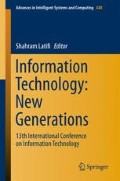Abstract
RSA is a popular public key algorithm. Its private key operation is modular exponentiation with a composite 2k-bit modulus that is the product of two k-bit primes. Computing 2k-bit modular exponentiation can be sped up four fold with the Chinese Remainder Theorem (CRT), requiring two k-bit modular exponentiations (plus recombination). Multi-prime RSA is the generalization to the case where the modulus is a product of r ≥ 3 primes of (roughly) equal bit-length, 2k/r. Here, CRT trades 2k-bit modular exponentiation with r modular exponentiations, with 2k/r-bit moduli (plus recombination). This paper discusses multi-prime RSA with key lengths (=2k) of 2048/3072/4096 bits, and r = 3 or r = 4 primes. With these parameters, the security of multi-prime RSA is comparable to that of classical RSA. We show how to optimize multi-prime RSA on modern processors, by parallelizing r modular exponentiations and leveraging “vector” instructions, achieving performance gains of up to 5.07x.
Access this chapter
Tax calculation will be finalised at checkout
Purchases are for personal use only
Preview
Unable to display preview. Download preview PDF.
References
Jonsson, J., Kaliski, B.: Public-Key Cryptography Standards (PKCS) #1: RSA Cryptography Specifications Version 2.1. In RFC 3447, Network Working Group, IETF (2003). https://www.ietf.org/rfc/rfc3447.txt
Dierks, T., Rescorla, E.: The Transport Layer Security (TLS) Protocol Version 1.2. In RFC5246, Network Working Group, IETF (2008). https://www.ietf.org/rfc/rfc5246.txt
Barker, E., Roginsky, A.: Transitions: Recommendation for Transitioning the Use of Cryptographic Algorithms and Key Lengths. In NIST Special Publication 800-131A, p. 5 (2011). http://csrc.nist.gov/publications/nistpubs/800-131A/sp800-131A.pdf
NSA: Cryptography Today (Accessed September 2015). https://www.nsa.gov/ia/programs/suiteb_cryptography/index.shtml
Lenstra, A.K., Lenstra Jr., H.W. (eds.): The Development of the Number Field Sieve, vol. 1554. Lecture Notes in Mathematics. Springer, Berlin (1993)
Lenstra, A.K.: Unbelievable security matching AES security using public key systems. In: Advances in Cryptology, ASIACRYPT 2001, pp. 67–86. Springer, Heidelberg (2001)
Lesntra Jr., H.W.: Factoring integers with elliptic curves. The Annals of Mathematics 126(3), 649–673 (1987)
Thorsten, K., et al.: Factorization of a 768-Bit RSA modulus. In: Proceedings of the 30th Annual Cryptology Conference on Advances in Cryptology, CRYPTO 2010, Santa Barbara, CA, USA, 15-19 August 2010, pp. 333–350 (2010)
Langley, A.G.: Multi-prime RSA trade offs. In ImperialViolet (blog) (2011). https://www.imperialviolet.org/2011/04/09/multiprime.html
Buxton, M.: Haswell New Instruction Descriptions Now Available! Intel Corporation (2011). http://software.intel.com/en-us/blogs/2011/06/13/haswell-new-instruction-descriptions-now-available/
Gueron, S., Krasnov, V.: Software implementation of modular exponentiation, using advanced vector instructions architectures. In: Proceedings of the 4th International Conference on Arithmetic of Finite Fields, WAIFI 2012, pp. 119–135 (2012)
OpenSSL: The Open Source toolkit for SSL/TLS. http://www.openssl.org/
Gueron, S., Krasnov, V.: OpenSSL multi-prime patch. https://github.com/vkrasnov/multiprime
Gueron, S., Krasnov, V.: [PATCH] Efficient, and side channel analysis resistant 1024-bit modular exponentiation, for optimizing RSA2048 on AVX2 capable x86_64 platforms. OpenSSL patch, posted July 2012. https://rt.openssl.org/Ticket/Display.html?id=2850
Intel Corportaion: Intel® Architecture Instruction Set Extensions Programming Reference. Intel, August 2015. https://software.intel.com/sites/default/files/managed/07/b7/319433-023.pdf
Gueron, S., Krasnov, V.: [PATCH] Efficient 1024-bit and 2048-bit modular exponentiation for AVX512 capable x86_64. OpenSSL patch, posted January 2014. https://rt.openssl.org/Ticket/Display.html?id=3240
Gueron, S., Krasnov, V.: [PATCH] Fast modular exponentiation with the new VPMADD52 instructions. OpenSSL patch, posted November 2014. https://rt.openssl.org/Ticket/Display.html?id=3590
Gueron, S., Drucker, N.: [PATCH] Fast 1536-bit modular exponentiation with the new VPMADD52 instructions. OpenSSL patch, posted September 2015. https://rt.openssl.org/Ticket/Display.html?id=4032
Acknowledgements
This research was supported by the PQCRYPTO project, which was partially funded by the European Commission Horizon 2020 research Programme, grant #645622.
Author information
Authors and Affiliations
Corresponding author
Editor information
Editors and Affiliations
Rights and permissions
Copyright information
© 2016 Springer International Publishing Switzerland
About this paper
Cite this paper
Gueron, S., Krasnov, V. (2016). Speed Records for Multi-prime RSA Using AVX2 Architectures. In: Latifi, S. (eds) Information Technology: New Generations. Advances in Intelligent Systems and Computing, vol 448. Springer, Cham. https://doi.org/10.1007/978-3-319-32467-8_22
Download citation
DOI: https://doi.org/10.1007/978-3-319-32467-8_22
Published:
Publisher Name: Springer, Cham
Print ISBN: 978-3-319-32466-1
Online ISBN: 978-3-319-32467-8
eBook Packages: EngineeringEngineering (R0)

